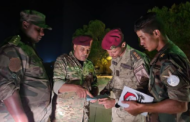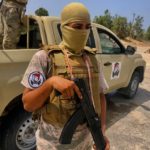In Al-Asaba, the Libyan National Army announced on June 2 that its units had shot down a Turkish UAV over the city.
In Al-Wishka, the Libyan Army under the command of the Government of National Accord (GNA) has seized on June 6 full control of Al-Wishka town near Sirte.
In Tarhouna, Libya’s UN-recognised unity government retook the town of Tarhouna southeast of Tripoli on June 5, depriving Khalifa Haftar of his last redoubt in the west, a spokesman said.
In Tripoli, Libya’s internationally recognized government based in Tripoli and led by Fayez al-Sarraj claimed to have liberated all of Greater Tripoli from Haftar’s forces, on June 3
On the international level, the Egyptian President Abdel Fattah El Sisi proposed “Cairo Declaration and Cairo Initiative” to resolve the Libyan crisis in the presence of Khalifa Haftar and Tobruk-based House of Representatives Speaker Aqila Saleh on June 6.
AL-ASABA – GHARYAN
- the Libyan National Army announced on June 2 that its units had shot down a Turkish UAV over the city of Al-Asaba, which the LNA had taken control of on June 1, after the withdrawal of the forces of the National Accord government from it towards Gharyan;
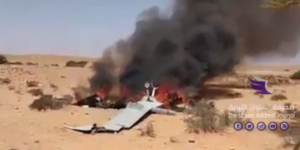
- the Libyan National Army (LNA) shot down Turkish drone over Al-Asaba town on June 1. LNA seized control of Al-Asaba following clashes with armed groups affiliated with the Tripoli-based Government of National Accord (GNA). LNA also issued an alert for its soldiers not expose their movements by posting updates on social media;
- Khalifa Haftar’s forces have conducted attacks under a drone cover on Ghout al-Reeh town between Gharyan and Al-Urban, which is one of Haftar’s latest footholds in western Libya. A convoy of about 70 military vehicles headed to Ghout al-Reeh from which the Government of National Accord forces withdrew after UAE drone strikes, said sources from Al-Urban town, adding that Haftar’s forces then advanced on Al-Asaba and entered without fighting.
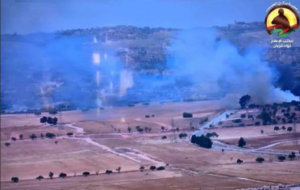
AL-HISHA
- the Libyan National Army (LNA) has launched a counter-attack against the Turkey-backed militias in the Al-Hisha area east of Misrata, after conducting a series of airstrikes, announced the Spokesman of LNA on June 6.
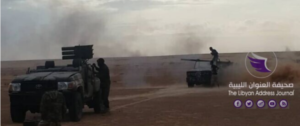
AL-WISHKA
- the Libyan Army under the command of the Government of National Accord (GNA) has seized on June 6 full control of Al-Wishka town near Sirte, according to the spokesman for the Sirte-Jufra Operations Room Abdelhadi Drah.
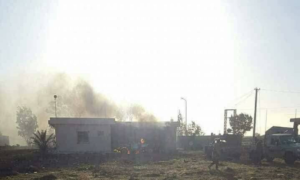
BANI WALID – URBAN
- the Libyan Army announced on June 5, the total liberation of the town of Urban, some 80 km south of Tripoli, shortly after the liberation of the city of Tarhouna, which was a stronghold for Haftar’s forces in the west. Having captured Tarhouna and Urban, the Volcano of Rage Operation also declared total control of the city of Bani Walid, along with its Airport, previously used by Haftar’s forces for the transportation of weapons and mercenaries.
TARHOUNA
- Libya’s UN-recognised unity government retook the town of Tarhouna southeast of Tripoli on June 5, depriving Khalifa Haftar of his last redoubt in the west, a spokesman said. “Our heroic forces have extended their control over the whole of Tarhouna,” said Mohammed Gununu, spokesman for the Government National Accord.
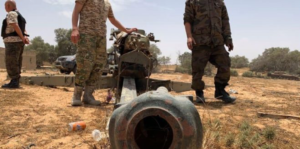
TRIPOLI
- Libya’s internationally recognized government based in Tripoli and led by Fayez al-Sarraj claimed to have liberated all of Greater Tripoli from Haftar’s forces, on June 3. Al-Sarraj congratulated his aligned forces in a telephone interview (believed to be made from Turkey) on a local radio station;
- the Libyan Army under the command of the Government of National Accord (GNA) has seized full control of Tripoli International Airport after heavy clashes since June 3 morning, spokesman Mohammed Gununu announced in the same day.
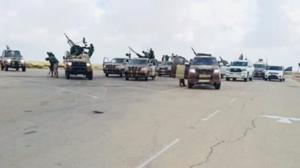
INTERNATIONAL RELATIONS
- Germany has called for an independent investigation of reports of extrajudicial killings committed by armed groups affiliated with the Government of National Accord (GNA) in the city of Tarhouna;
- the United Nations Security Council (UNSC) has unanimously extended on June 7 the arms embargo on Libya for an additional 12 months, requesting a full report from the UN Secretary-General, Antonio Guterres within an 11-month period of its implementation;
- the United Nations Support Mission in Libya (UNSMIL) has welcomed on June 7 the calls by international and regional actors in recent days for an immediate cessation of hostilities in Libya;
- Italy has welcomed on June 7 the initiative to resolve the Libyan crisis announced by Egyptian President Abdel Fattah El Sisi. “Italy has always been supportive of any initiative which, if accepted by all parties involved and within the framework of the Berlin process, could favor a political solution of the Libyan crisis,” reads the statement of the Italian foreign ministry;
- the United States and Russia have welcomed, on June 6, the comprehensive initiative to resolve the Libyan crisis announced by Egyptian President Abdel Fattah El Sisi, in the presence of the Libyan National Army Commander, Field Marshal Khalifa Haftar, and President of the House of Representatives Aqila Saleh, in Cairo;
- French Foreign Minister, Jean-Yves Le Drian, on June 6 held a phone conversation with his Egyptian counterpart, Sameh Shoukry, after Cairo announced an initiative to solve the Libyan crisis;
- Jordan appreciated the Egyptian efforts to solve the Libyan crisis, which resulted in the “Cairo Declaration” initiative launched by Egyptian President Abdel Fattah El Sisi on June 6, during a press conference with the Speaker of the Libyan House of Representative (HoR), Aqila Saleh, and the Commander of the Libyan National Army (LNA), Field Marshal Khalifa Haftar;
- the Egyptian President Abdel Fattah El Sisi proposed “Cairo Declaration and Cairo Initiative” to resolve the Libyan crisis in the presence of Khalifa Haftar and Tobruk-based House of Representatives Speaker Aqila Saleh on June 6;
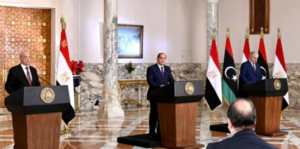
- Turkey’s special envoy to Libya, Emrullah Isler has said that the victory achieved by the nationally recognized government in Tripoli (GNA) is a major step towards a strong, democratic, and civilized Libyan state;
- the United States Embassy in Libya has condemned the use of IEDs and booby traps, designed specifically to harm innocent civilians attempting to return to their homes;
- Turkey and Libya plan to advance cooperation in the Eastern Mediterranean, including search and drilling activities, to further benefit from natural resources, said the Turkish president in a meeting with the Libyan prime minister on June 4, Anadolu Agency reports;
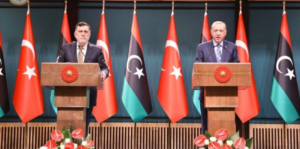
- the Russian Foreign Minister Sergey Lavrov met in Moscow on June 3 with the Libyan Foreign Minister Mohammed Sayala and the member of the Presidential Council Ahmed Mitig to discuss recent developments in the country, including the return of Russian companies “once the situation stabilized,” the Russian Foreign Ministry said in a statement after the meeting;
- the Turkish National Security Council (MGK) said on June 2 it will continue providing military consultations and support to the legitimate Government of National Accord (GNA) in Libya until peace is achieved;
- the United States Ambassador to the United Nations, Kelly Craft, said that on June 2 interfering external parties must stop fueling the conflict in Libya. She added in her UN Security Council Briefing on the Cooperation between the UN and EU that all UN Member States must comply with the arms embargo, including by ceasing all support for Libyan factions and withdrawing all mercenary personnel;
- the Tunisian Labor Party announced its rejection of any American military presence in the Tunisian territories, on the background of AFRICOM’s disclosure, in a statement on June 1, of the possibility of deploying forces in Tunisia;
- the UAE and Egypt said on June 2 they welcomed an announcement that Libya’s rival administrations have agreed to resume talks on reaching a cease-fire in the country;
- on June 1, the French Foreign Minister, Jean-Yves Le Drian, in a telephone call with the head of the Presidential Council, Fayez al-Sarraj, stressed the need to stop all hostilities in Libya and to revive the outcome of the Berlin Conference, putting an end to foreign interference;
- the Algerian Foreign Minister Sabri Boukadoum said on June 1 that his country’s mediation to find a political solution in Libya is ongoing despite the serious field developments;
- spokesman for the United Nations Secretary-General, Stephane Dujarric, condemned on June 1 the continued flow of arms and mercenaries to Libya and renewed calls for an immediate cessation of hostilities to allow the health authorities to cope with the Coronavirus outbreak;
- UNSMIL welcomed on June 1 the acceptance by the internationally recognized Libyan government in Tripoli and the Khalifa Haftar led Libyan National Army (LNA) of the resumption of talks on the ceasefire and associated security arrangements based on the draft agreement submitted by UNSMIL to the parties during the Joint Military Commission talks (5 + 5) (JMC) on 23 February 2020.




